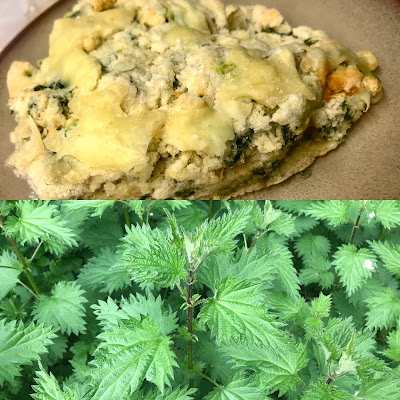For the first ever in my life, I enjoyed the delicious taste of Nettle Cake
courtesy of Pól Mac Raghnaill, a true guardian and lover of Terryland Forest Park.
As well as nettles sourced from the forest, it contained potatoes, flour,
milk, salt and pepper. Thanks Pol!
The tradition of ‘foraging’ is making a comeback.
I have happy memories of me and my childhood friends collecting
basket-loads of highly nutritious hazel nuts, nettles and blackberries from
hedgerows, meadows and woodlands to bring home to their moms to make cakes,
soups, jellies and jams.
Harvesting the wild flowers, fruits, herbs, fungi, roots and leaves of the forests has been integral to the fabric of humanity since our species first appeared on the planet.
It is only over the last fifty years that as a result of technology ‘development’, in the form of refrigeration, mechanised transport, chemical fertilisers, intensive agriculture, urbanisation and the growth in supermarket shopping, we in our consumer society have lost an understanding of the seasonality of food, of the importance of sourcing food locally and of the natural edible resources that exist in our local woods, hedgerows, seashores, rivers and meadows.
Disconnect with Nature leads inevitably to habitat destruction and the extinction of species.
However, there has been over the last decade increased involvement by the general public in growing food locally and organically, precipitated by a growing awareness of the dangers being brought about by man-made Climate Chaos. During COVID-19, it is so lovely the surge in people setting up organic vegetable gardens at their homes. It is cool now to be a gardener!
Harvesting the wild flowers, fruits, herbs, fungi, roots and leaves of the forests has been integral to the fabric of humanity since our species first appeared on the planet.
It is only over the last fifty years that as a result of technology ‘development’, in the form of refrigeration, mechanised transport, chemical fertilisers, intensive agriculture, urbanisation and the growth in supermarket shopping, we in our consumer society have lost an understanding of the seasonality of food, of the importance of sourcing food locally and of the natural edible resources that exist in our local woods, hedgerows, seashores, rivers and meadows.
Disconnect with Nature leads inevitably to habitat destruction and the extinction of species.
However, there has been over the last decade increased involvement by the general public in growing food locally and organically, precipitated by a growing awareness of the dangers being brought about by man-made Climate Chaos. During COVID-19, it is so lovely the surge in people setting up organic vegetable gardens at their homes. It is cool now to be a gardener!
Over the last few weeks I have also come across a number of people out harvesting
nettles in the Terryland Forest Park. Many are originally from countries where foraging
is still a living tradition. Collecting wild foods is good for both the mind
and body as well as putting us back in touch with the sights, sounds and smells
of Nature.
However a few principles need to govern those harvesting wild food:
1. Be moderate in what you take home as the berries and nuts that you are collecting are the natural food sources for much of the birds, insects and animals of the countryside and our urban natural areas.
2. Do not remove the whole plant; take only the edible parts that you require such as the fruits and leaves whilst leaving the roots and some of fruits and leaves so that it can grow again.
3. Many fungi and fruits are poisonous. So if you are unsure, take someone with you that is familiar with the culinary aspects of plants and fungi.
1. Be moderate in what you take home as the berries and nuts that you are collecting are the natural food sources for much of the birds, insects and animals of the countryside and our urban natural areas.
2. Do not remove the whole plant; take only the edible parts that you require such as the fruits and leaves whilst leaving the roots and some of fruits and leaves so that it can grow again.
3. Many fungi and fruits are poisonous. So if you are unsure, take someone with you that is familiar with the culinary aspects of plants and fungi.

No comments:
Post a Comment